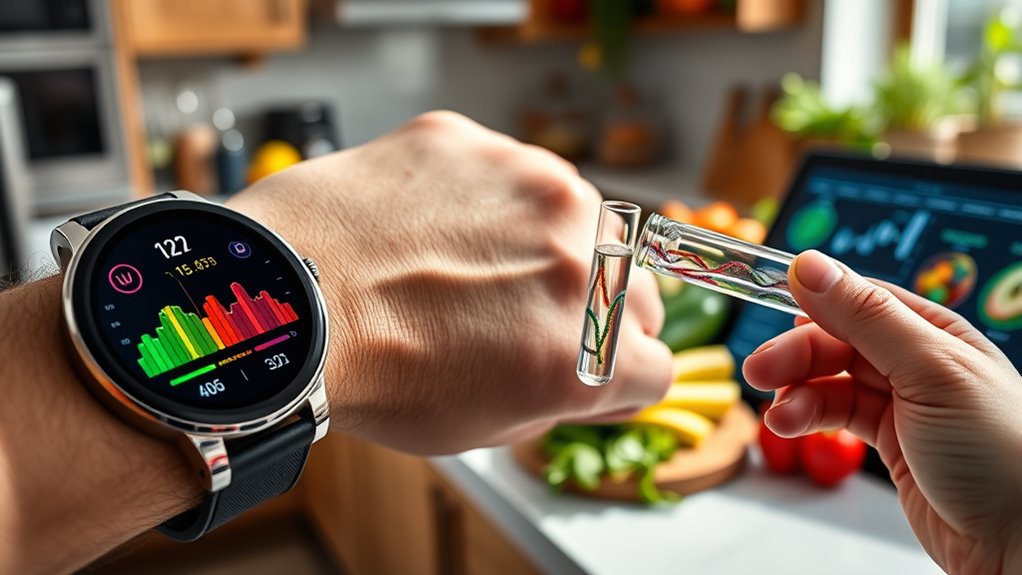Personalized nutrition combines wearable devices and genetic testing to customize your diet based on how your body responds to different foods and habits. Wearables track your essential signs, sleep, and activity in real-time, providing immediate feedback to improve energy, mood, and recovery. Genetic insights reveal how you metabolize nutrients and your predispositions. Together, these tools help create adaptable, targeted plans for better health and performance. Keep exploring to discover how these innovations can optimize your dietary journey.
Key Takeaways
- Wearables track real-time physiological responses to foods, enabling personalized dietary adjustments and improved health outcomes.
- Genetic testing reveals individual nutrient metabolism and predispositions, guiding customized nutrition strategies.
- Combining wearable data and DNA insights allows for dynamic, tailored diet plans that adapt to ongoing bodily responses.
- Personalized feedback from wearables helps identify foods or habits affecting sleep, stress, and energy levels.
- These technologies support smarter, sustainable dietary choices, reducing disease risk and enhancing overall well-being.

Have you ever wondered if your diet could be tailored specifically to your body’s unique needs? With advances in technology, personalized nutrition is becoming more accessible and accurate than ever before. Wearables like fitness trackers and smartwatches continuously monitor your vital signs, activity levels, sleep patterns, and even stress levels. This data helps create a detailed picture of how your body responds to different foods and habits, allowing for more targeted dietary recommendations. For example, if your wearable detects that your blood sugar spikes after certain meals, you can adjust your intake to maintain steadier levels. Over time, this personalized feedback helps you understand which foods support your energy, mood, and overall health, rather than relying on generic dietary guidelines.
Personalized nutrition uses wearable data to optimize your diet and improve overall health.
In addition to wearables, DNA testing has opened a new frontier in nutrition. By analyzing your genetic makeup, you can discover how your body metabolizes nutrients, your predisposition to certain conditions, and your unique responses to various diets. For instance, some people are better at processing fats or carbohydrates, while others might have genetic markers indicating a higher risk for lactose intolerance or gluten sensitivity. Armed with this information, you can fine-tune your diet to optimize digestion, energy levels, and even long-term health outcomes. Instead of following broad recommendations, you’re empowered to make choices that align with your genetic blueprint, increasing the likelihood of sustainable success.
Combining data from wearables and DNA tests creates a detailed, personalized nutrition plan. This approach allows you to move beyond one-size-fits-all diets and focus on what’s genuinely effective for your body. For example, if your DNA suggests you thrive on a higher-protein diet and your wearables show improved activity recovery when consuming more protein, you can intentionally incorporate more of these foods into your routine. Conversely, if certain foods cause adverse reactions or disrupt sleep, you can avoid them altogether. This synergy between real-time monitoring and genetic insights makes your nutrition plan dynamic and adaptable, constantly evolving based on your body’s responses.
Ultimately, personalized nutrition leverages cutting-edge technology to help you make smarter, more informed dietary choices. Instead of guessing or following fad diets, you gain precise insights tailored to your biology and lifestyle. This proactive approach can improve your energy, enhance recovery, support weight management, and reduce the risk of chronic diseases. As these tools become more refined and accessible, you’re empowered to take control of your health in ways that were impossible just a few years ago. Your body is unique, and now, your diet can be too. Additionally, understanding vetted information about nutrition can further optimize your personalized approach.
Frequently Asked Questions
How Accurate Are Wearable Devices in Tracking Nutritional Data?
Wearable devices can be fairly accurate for tracking certain aspects like activity levels and heart rate, but they’re less precise with nutritional data. They often rely on user input or estimations, which can lead to inaccuracies. While some wearables now include features like food logging or glucose monitoring, you should remember they’re best used as general guides rather than exact measures. Always cross-check with professional advice for detailed nutrition info.
Can Dna-Based Diets Account for Allergies or Intolerances?
Yes, DNA-based diets can account for allergies or intolerances. Studies show that about 15% of the population has food allergies, and genetic testing helps identify specific sensitivities. By analyzing your DNA, you can tailor your diet to avoid allergens and intolerances, reducing adverse reactions. This personalized approach allows you to optimize your nutrition while minimizing health risks, making it a promising tool for managing dietary restrictions effectively.
What Privacy Concerns Exist With Genetic and Wearable Health Data?
You should be aware that sharing your genetic and wearable health data raises privacy concerns. Your information could be accessed or misused if not properly protected, risking identity theft or discrimination. Data breaches are possible, and some companies might share your data with third parties without your explicit consent. To protect yourself, always review privacy policies and opt for secure, reputable services that prioritize your data security.
How Affordable Is Personalized Nutrition Compared to Traditional Diets?
Personalized nutrition can be more affordable than traditional diets because it tailors recommendations to your specific needs, reducing unnecessary expenses on generic foods or supplements. As wearable devices and DNA testing become more common and tech prices drop, costs decrease, making personalized plans accessible. While initial assessments might seem pricey, in the long run, you save money by focusing on what truly works for your body, avoiding costly trial-and-error diets.
Are There Risks Associated With Relying Solely on Wearables and DNA Data?
You might think relying solely on wearables and DNA data is risk-free, but it’s not. While these tools offer personalized insights, they can be inaccurate or incomplete. You could miss important health factors or misinterpret data, leading to poor dietary choices. It’s wise to utilize them as guides rather than sole sources of truth. Combining this tech with professional advice helps ensure you make safer, more informed decisions about your diet.
Conclusion
Just as Da Vinci studied the human form to unveil its secrets, you now hold the tools to decode your unique nutritional needs. Wearables and DNA insights empower you to craft a diet as tailored as a masterpiece, blending science and intuition. By embracing personalized nutrition, you become the artist of your health, painting a vibrant, balanced future. The canvas is yours—use it wisely, and let your well-being be a living work of art.










